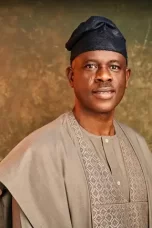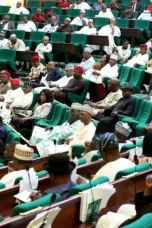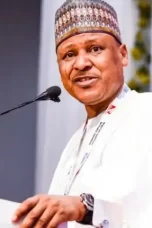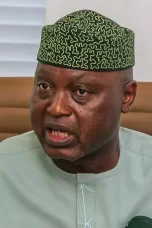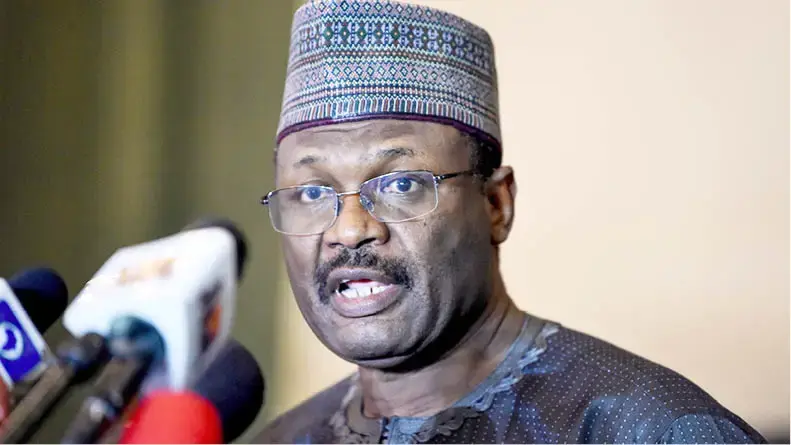
On February 25, 2023, Nigerians trooped out in their millions to choose a president and members of their national legislative bodies (House of Reps and Senate).
The enthusiasm was largely fueled by the marketing gimmick employed by Professor Mahmood Yakubu, the national chairman of the Independent National Electoral Commission, INEC. More than any other election management body (EMB) chair before him, Yakubu promised Nigerians that, armed with the Electoral Act 2022 as amended, Nigerians should get set to participate in the best elections of their lives because of the innovations in the Act, as well as the commitment of his INEC to deliver on promises made and assurances given to both Nigerians and the international community. However, the elections poured cold water on the excitement of many Nigerians owing to the failure of INEC to upload real-time results of the presidential election from the polling unit level as promised by Yakubu on the one hand and marred by the usual brigandage and violence associated with elections in Nigeria.
Unfortunately, the statutes upon which the opposition Peoples Democratic Party, PDP, and Labour Party, LP, leaders based their petitions against the election that saw Yakubu declare Bola Ahmed Tinubu of the All Progressives Congress, APC, as president were, ironically, deployed to nullify the petitions because none met the threshold of proving that the issues raised amounted to substantial non-compliance with the provisions of the 1999 Constitution as amended, the Electoral Act 2022 and the Guidelines for the Conduct of Elections 2023 as released by INEC. Both the Presidential Election Petition Tribunal, PEPT, and the Supreme Court, trashed the petitions. So, what went down on February 25, 2023, that caused so much tension in the land?
This report will show the extent of vicarious complicity of Professor Yakubu as evidenced by the Supreme Court declaration that the INEC Chairman over-promised and under-delivered about the inherent magic of the “Bimodal Voter Accreditation System (BVAS) for both voter accreditation and e-transmission of results for collation and the IReV portal”. Had he delivered on his promise, the level of anxiety in the polity would have been tamed. The report will also discuss the systematic disenfranchisement of eligible voters, and the violence that attended the elections as well as point out the missteps by the leading opposition political parties. The report will also lay bare why future elections in Nigeria have been imperilled by the conduct of the elections of last year. Going forward, the report concludes with steps to be taken to avoid the looming spectre of democracy fatigue.
An election like none other
Just like yesterday! Exactly 52 weeks ago today, Nigerians trooped out in their millions to participate in the elections to choose a president and members of the legislative bodies. To some, it was an exercise fulfilled. For others, it was a fool’s errand. In the over 176,000 polling units across the country, some had it smooth while others had tales of woe to tell.
Contrary to expectations that all the results of the elections would be uploaded online, real-time from the polling units to the Independent National Electoral Commission, INEC, Result Viewing, IReV, and Portal, they were not uploaded. For an election that had been primed to deliver on that singular promise, many feared the worst.
For the 2023 elections, INEC budgeted more than N300 billion for its conduct, making it the most expensive. To be fair, Professor Mahmood Yakubu, national chairman of INEC, along with national commissioners and resident electoral commissioners made preparations for the smooth outcome of the election. But how the result of only the presidential election was not uploaded while those of the House of Representatives and Senate, held on the same day and at the same time were uploaded, remains a mystery.
Glitch
Yet, many still believe that a glitch could have, indeed, occurred leading to the non-upload of results of the presidential election from the polling units, the flip-flop from INEC, the body language of Professor Yakubu before the elections, and the sometimes incoherent messaging from INEC’s national commissioner in charge of publicity, Barrister Festus Okoye, sent reverberating dissonance in the context of believability of what actually happened to the process of uploading which affected only the presidential election that day. Still, INEC did not mention it via a statement or a public announcement until tongues started wagging, and opposition party leaders complained, leading to further unwholesome speculations that there was a deliberate plan to sabotage the elections from within the commission. Till date, INEC has laboured in vain to explain to Nigerians what actually constituted the glitch that affected the upload of the results of the presidential elections alone.
Before the day of the election, INEC had issued statements sometimes repudiating its own processes, conflating between uploading results online while leaving out the real-time component, just as it sometimes sold out its RECs to impose duplicitous outcomes of already concluded primaries. The outcomes of some post-primary litigations made a mockery of the statutes as there were conflicting interpretations from INEC officials, thereby creating a widow for scant regard for due diligence and proper conduct of affairs..
INEC forewarned
However, Professor Yakubu came out boldly in November 2022 to assert the sacrosanctity of uploading results online, in real-time from polling units. The report of an independent investigation
conducted by Vanguard and published on Monday, November 21, 2022, titled ’How politicians still threaten credible polls – INEC Source’, exposed the possible rigging methods that may arise in the event that INEC did not upload results from polling units realtime. The report was pooh-poohed by Professor Yakubu as fake news. According to Yakubu, “Let me seize this opportunity to respond to a story emanating from a section of the media that the commission has decided to jettison the uploading of polling unit results in real time on election day.
It should be disregarded as fake news. The commission will upload polling unit-level results and citizens will have access to these results in real-time as they upload from polling units. This innovation was introduced by the commission and the commission cannot turn around and undermine itself. This technology has come to stay, we will upload polling unit results and citizens will have the right to view these results.
After all, we are serving the citizens. How can we deny citizens access to the results of the process conducted by them at the polling unit? I want to reassure you that the 2023 election is going to be our best ever election and we are committed to ensuring that votes cast by Nigerians will determine the outcome of elections, nothing more, nothing less.” Unfortunately, this did not happen for the presidential election.
Voter suppression
The glitch was not the only culprit. Many who had trooped out early to vote suddenly discovered that their polling units had been moved. Getting the new location of the polling units became a problem for many intending voters. Some never located their polling units, while others just abandoned their civic duty and went back home, owing to frustration. Some INEC officials, too, had problems locating polling units. In some areas, election materials did not arrive on time. This led to delays in many parts of the country. Contrary to the assurances given by INEC that those in the queue at the time voting was expected to stop would be allowed to vote, this did not happen in many places. Whereas voting in some areas went past the closing hour of 3 pm because of delays caused by INEC’s sloppiness, once it became dark, people were not allowed to cast their votes again. This led to chaos in some areas across the country.
Then there were issues of voter suppression through intimidation. Hired guns of political parties across the board intimidated voters in their supposed areas of strength. Those who were simply turned back from voting for other parties were lucky. Others were not. Some were bloodied and bludgeoned. It was a free-for-all while some security personnel looked on. Compared to past elections, the security services deserve commendation for the way they conducted themselves last year. Yet, in other instances, they represented the worst of the worst.
BVAS worked, but…
In the case of BVAS (Bi-modal Voter Accreditation System), it worked only to the extent that it was not tampered with. In one of the states in the South-South, a video of empty BVAS boxes at local government headquarters went viral. What that meant was that BVAS was never used in those areas but election results were declared. And where they were used, they were manipulated. Either owing to improper training of electoral officers or the unteachability of some, BVAS sent strange returns to the IReV Portal. Instead of figures, human faces were received on IReV in some cases.
Opposition parties did not help themselves
If INEC failed to deliver on its mandate, the political parties, too, did not fare well, especially the opposition parties. In an election that was so crucial, the opposition parties needed to have empowered their polling agents in such a way that nothing untoward would go past them, collate all the infractions and illegalities observed, forward the same to a central area where information could be distilled for possible litigation. This failure on the part of the opposition parties allowed INEC to get away with blue murder. That was why nothing could be proved before the Presidential Election Petition Tribunal, PEPT, and the Supreme Court despite all the hue and cry about irregularities. Yes, there were irregularities.
Substantial compliance
But were the irregularities substantial enough, as stated in Section 134(2) of the Electoral Act 2022? Substantial, in the context of electoral matters, maybe too nebulous a word to determine. For, in an area of 356,669 (three fifty-six thousand, six hundred and sixty-nine square miles), with a voting population of over 90 million, filling over 176,000 (one hundred and seventy-six thousand) polling units across 360 federal constituencies spread across 774 local government areas and 36 states, what constitutes substantial? Where and how would substantial non-compliance be determined? Would it be a quantum of a quarter of the total activities during the election that would constitute substantial or voting affecting a quarter of the voting population or the actual number of those who voted? Or half?
Based on the judgment by the Justices of the Supreme Court, JSCs, on the failed petitions of PDP and LP, it is now incumbent on INEC to ensure that it conducts elections in a manner that inspires confidence in the people. Had Professor Yakubu not over-promised and under-delivered about the inherent magic of the “Bimodal Voter Accreditation System (BVAS) for both voter accreditation and e-transmission of results for collation and the IReV portal”, the level of anxiety in the polity would have been tamed. If this was a marketing gimmick employed by Yakubu to entice the voting public to have a buy-in in the 2023 general elections, it worked because it was based on his promise of an inclusive and transparent process that voters were galvanised to massively participate.
Jega’s suggestions
Former INEC Chairman, Professor Attahiru Jega has been making some interventions going forward. According to Jega, there are areas where processes would need to improve like unbundling of INEC, vote buying, delimitation, proliferation, registration and monitoring of parties, voting rights and inclusivity, technology in elections, institutional independence and effectiveness of INEC. He also suggested how to improve the Electoral Act 2022 and what legislators must do. The former INEC chairman has been speaking about these and many more. It is hoped that the authorities will listen.
Vanishing tribe of Nigerian voters
Apart from 2003 when 39 million Nigerians were said to have trooped out to vote, a figure representing 69.1%, the tribe of Nigerians who vote at every general election cycle have continued to dwindle. (See box). In 1999, 29.8 million people were said to have voted (52.3%); in 2007, 35.4 million voted (57.5%); in 2011, 38.2 million voted (53.7%); in 2015, 28.6 million voted (43.7%); in 2019, 27.3 million voted (34.8%); and in 2023, 24 million voted (26.7%).
So, why have the figures been shrinking? A combination of factors, ranging from voter apathy occasioned by a lack of trust in INEC and the continuing hardship voters face on the day of the election, logistical issues that appear not to be improving, election day violence which scares voters away and a growing frustration on the part of voters that their votes do not count, is responsible.
Why the problem may get worse in 2027 is that for all the promises and assurances given by Professor Yakubu about the inviolability of BVAS and IReV, promises which galvanised millions of Nigerians to show interest in the election, their hopes were dashed once it was discovered that some results were not uploaded.
To avoid this, there is a need for the strengthening of weaknesses in pre-election matters and needed reforms in post-election dispute resolution as well as fortification of BVAS and result transmission.


